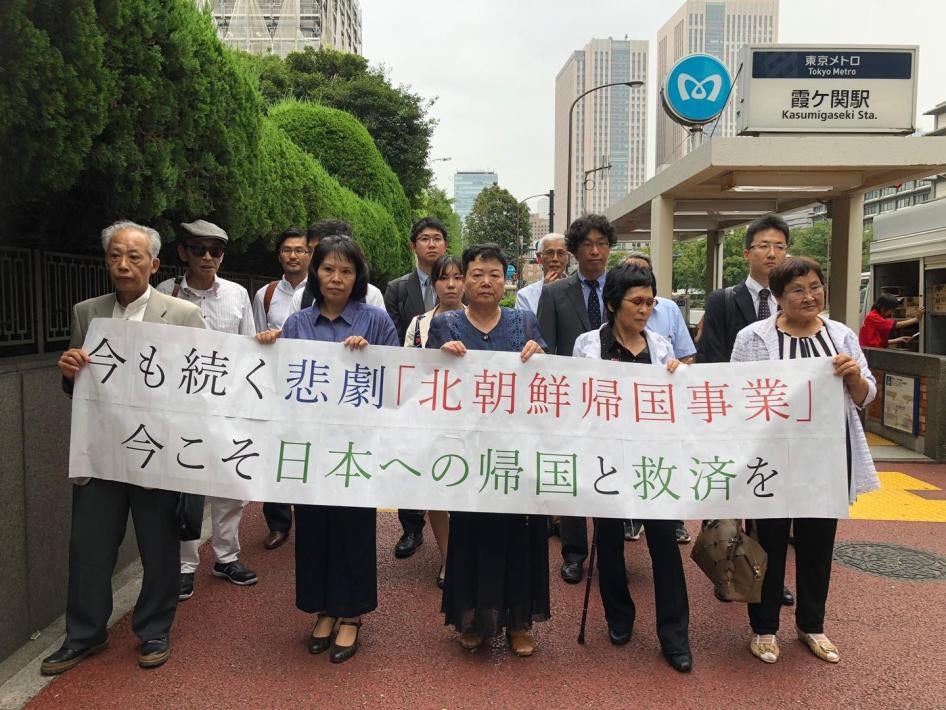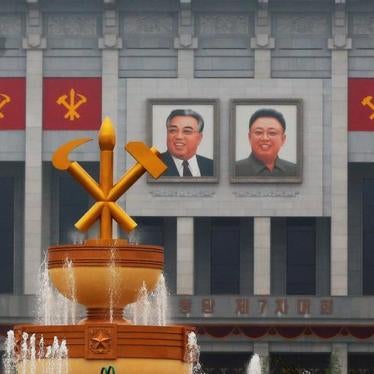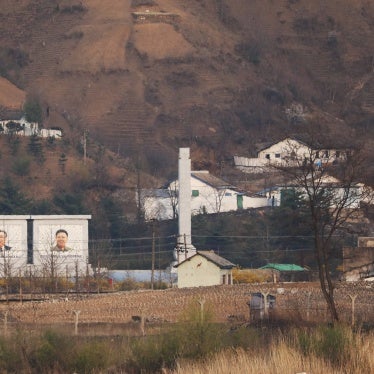(Tokyo) – Japan should publicly urge the North Korean government to immediately allow ethnic Koreans lured to North Korea from Japan and their relatives to return to Japan, Human Rights Watch said today. Prime Minister Shinzo Abe should follow up this demand with North Korea’s leader, Kim Jong Un, in any possible future summit.
Five victims of the “Paradise on Earth” campaign, which recruited Koreans in Japan to North Korea on false promises, sued the North Korean government for damages on August 19, 2018. At a news conference at the Tokyo District Court, the victims and their lawyers said North Korea should let the program’s victims and their relatives depart the country.
“The Paradise on Earth victims believed the propaganda, but what they encountered in North Korea was hell, not paradise,” said Kanae Doi, Japan director. “The Japanese government should face its role in facilitating this historical wrong, recognize that the victims are still suffering, and set the situation right by supporting these victims’ demands.”
Between 1959 and 1984, approximately 93,000 ethnic Koreans (Zainichi) and Japanese migrated from Japan to North Korea under the program’s auspices. The North Korean government, mostly through the General Association of Korean Residents in Japan (Chongryon), a pro-Pyongyang organization, propagandized that North Korea was a “Paradise on Earth,” and “anything needed for life including housing, food, clothes are fully guaranteed.”
The governments of both North Korea and Japan (through a cabinet resolution) endorsed the program at the highest levels. But given the absence of diplomatic relations between the two, it was largely carried out by Chongryon, with support from the Japanese and North Korean Red Cross Societies and facilitation by the International Committee of the Red Cross (ICRC).
In the lawsuit, the plaintiffs demand damages from the North Korean government for luring ethnic Koreans in Japan on false premises. The plaintiffs maintain that North Korea intended to attract ethnic Koreans, especially skilled workers and technicians, to meet its labor shortage. While victims quickly realized that North Korean promises were false, often even when they first arrived at the port of entry, the authorities never allowed them to return to Japan.
The program’s survivors stated that once they arrived in North Korea, the government moved quickly to control their lives down to the smallest detail, including mandating what to think, what to say, and where to live, study, and work. Authorities rationed food, censored or blocked their communications with family members in Japan, and compelled them to spy and report on their neighbors. If the North Korean government suspected them of disloyalty, they faced imprisonment in forced labor or political prisoner camps, enforced disappearances, or even death.
The five plaintiffs are all victims of the Paradise on Earth campaign who left Japan between 1960 and 1972, and escaped North Korea between 2001 and 2003. Human Rights Watch interviewed them at various points during 2018.
- Eiko Kawasaki, 76, left Japan at age 17 on her own and escaped North Korea in 2003.
- Hiroko Sakakibara, 68, left Japan at age 11 with her parents, who believed the family’s poverty could be alleviated in North Korea.
- Ko Jong-mi, 57, left Japan in 1963 at age 2 with her family. Her older brother, shocked by the reality of North Korea, refused to leave the ship and demanded to go back to Japan. North Korean authorities arrested him on the spot and detained him in a center for the mentally ill. He died in detention around 1971. Ko escaped in 2003.
- Manabu Ishikawa, 60, left Japan in 1972 as a junior high school student, with his brother and sister. His sister suffered a mental breakdown shortly after her arrival in North Korea, and died in a hospital in 1991. Ishikawa escaped in 2001.
- Hiroko Saito, 77, a Japanese national, left Japan in 1961 with her Korean husband and her 1-year-old daughter, who eventually died in a North Korean detention facility. Saito escaped in 2001.
This is the first lawsuit brought by people living in Japan against the North Korean government. In attempting to overcome sovereign immunity and hold the North Korean government directly responsible, the lawsuit is similar to a legal action filed in April by the parents of Otto Warmbier, the US student who was detained by North Korean authorities and released with severe brain damage, before dying days later.
Many Paradise on Earth victims who escaped are afraid to speak out because they fear reprisals against their relatives who are still in North Korea, but others have made ongoing efforts to achieve justice. In 2008, Ko Jong-mi sued Chongryon, but her claim was denied because of the statute of limitations.
In January 2015, 12 victims, including the current five plaintiffs, petitioned the Japan Federation of Bar Associations under a human rights procedure. They sought an investigation into responsibility for the program. They also said all victims of the Paradise on Earth campaign should be allowed to leave North Korea, and requested the federation recommend that the North Korean and Japanese governments, Chongryon, the Japanese and North Korean Red Cross Societies, and ICRC work for the return of victims. The Japan Federation of Bar Associations created a group to investigate the claims, which is still working on the matter.
In February 2018, Eiko Kawasaki filed a petition at the International Criminal Court (ICC), contending that this resettlement program constituted a crime against humanity and requesting the ICC prosecutor open an investigation. The five plaintiffs repeatedly told Human Rights Watch they are determined to stand up for justice on behalf of the voiceless victims who are still trapped and suffering in North Korea.
A 2014 Commission of Inquiry into human rights in North Korea report found that crimes against humanity were committed against people detained in political prison camps or other prisons, people attempting to flee the country, and people adhering to Christianity or accused of introducing subversive influences. The commission also found that that since 1959, “more than 93,000 persons were lured by false promises to migrate from Japan to the DPRK [Democratic People’s Republic of Korea].… Many of them ended up in political prison camps and other places of detention in the DPRK. Among them were also several thousand Japanese nationals who had been expressly promised the right to leave the DPRK.”
“Prime Minister Abe should meet with and find inspiration from this group of victims of the Paradise on Earth campaign, and work tirelessly to bring them justice,” Doi said. “The Prime Minister should raise the Paradise on Earth cases during any possible future summit with Kim Jong Un, and demand that those remaining in North Korea and their family members be allowed to return to Japan.”








